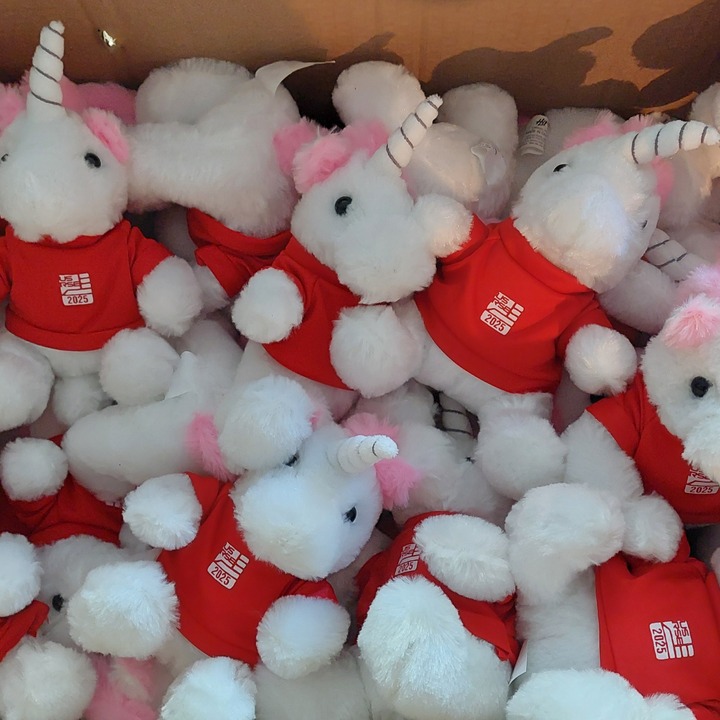US-RSE June 2025 Newsletter
🔍 This Month: A Peek at the US-RSE Website — What Brings You Here? 🔍
Published: Jun 29, 2025 by Tinashe M. Tapera
Welcome to this month’s edition of the US-RSE Newsletter! A few weeks ago, I found myself wondering: Who visits the US-RSE website? What are they looking for? How are they finding us? To satisfy that curiosity, I took a dive into our Google Analytics data, and uncovered some interesting patterns. In this issue, we’ll explore a few highlights from our website traffic that offer a glimpse into how our community is connecting with US-RSE online, and consider what these insights might mean for the future of our digital presence.

In this issue:
- 1. USRSE’25 Conference
- 2. A Peek at the US-RSE Website — What Brings You Here?
- 3. Steering Committee Updates
- 4. Organizational Founding Membership
- 5. Community and Travel Funds
- 6. Community News
- 7. Interesting Events and Opportunities
- 8. Featured Reads, Videos, or Podcasts
- 9. Get Involved
- 10. Recent Job Postings
🔔 1. US-RSE Conference 2025 (USRSE’25)

Are you making plans to join us in 🦅 Philadelphia, Pennsylvania 🦅 October 6-8, 2025? The theme for the third annual conference from the United States Research Software Engineer Association (US-RSE) is “Code, Practices, and People.”
Thank you to all who have submitted work for this conference! Reviews are still underway and notifications should be sent by July 14. Registration opened in late June. Check out our registration page for information on rates and for the link to register through Eventbrite.
While the submission deadline for most formats has passed, we continue to invite poster submissions for USRSE’25. Poster submissions will be accepted through July 20.
Whether you’re a research software engineer, data scientist, digital humanist, scientific programmer, software developer, or research software user, US-RSE is where people at the intersection of code and research come together. The USRSE’25 conference is your chance to connect with peers, mentors, and experts in the fast-growing world of research software. Don’t just take our word for it—100% of last year’s post-conference survey respondents said they would return and recommend the conference to others.
Visit the conference website for further details including:
- Venue, hotel, registration, and travel details
- Posters: how and where to submit (still have questions? contact usrse2025@easychair.org)
- Dates for notification of acceptance and other important dates
🔍 2. A Peek at the US-RSE Website — What Brings You Here?
Web analytics is a fascinating and exciting application of data science involving the measurement, collection, analysis, and reporting of web data to understand and optimize website usage. Using a few simple techniques and powerful tools like Google Analytics 4, organizations like ours can learn incredible insights about who visits our website, what they do with it, and why. So, what does the US-RSE.org website data over the last 12 months tell us about ourselves?
Top Pages
When not accounting for the home page, we can see that the jobs page is the most utilized resource on the website. This is closely followed by conference page resources:
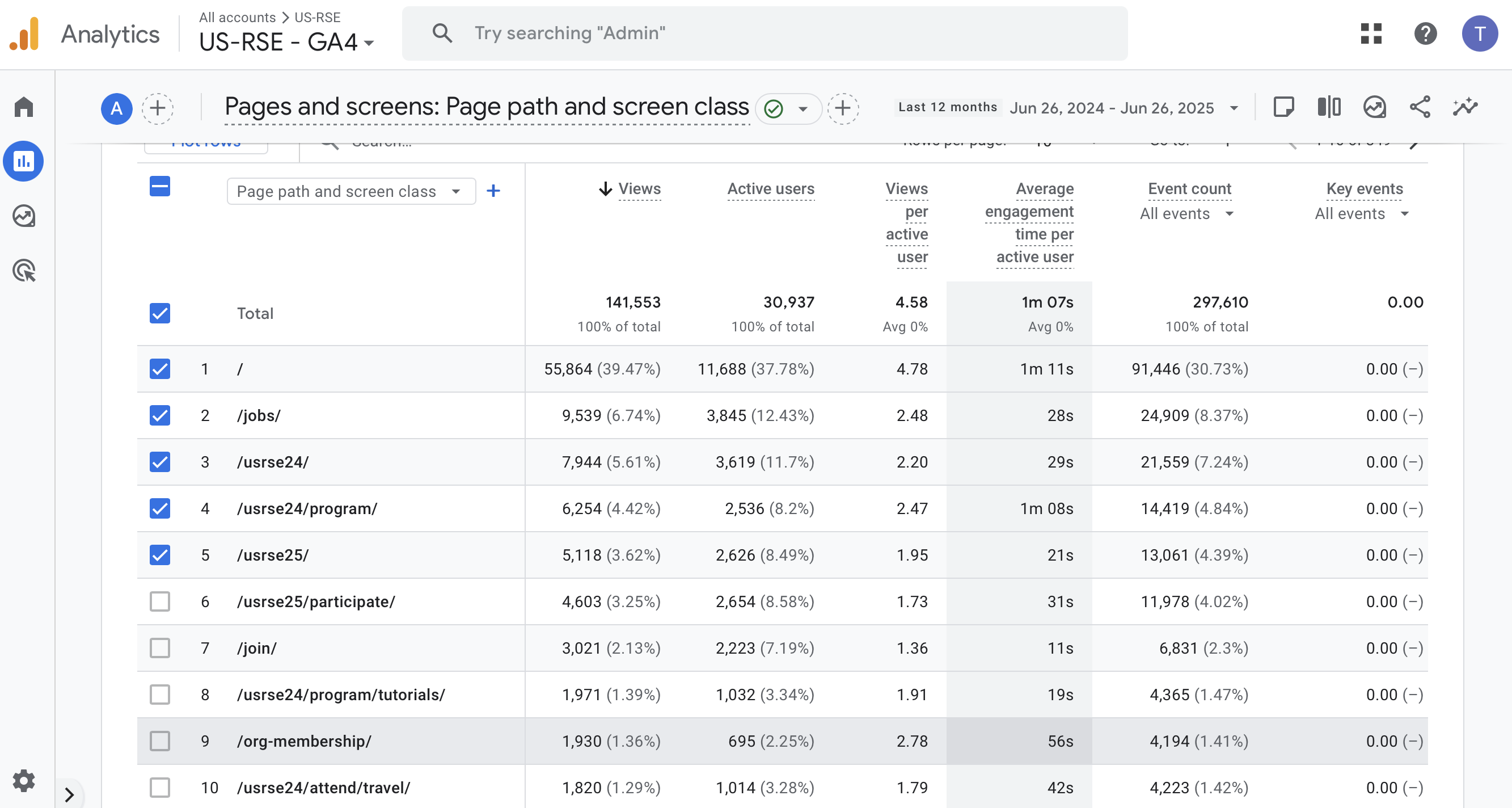
I believe this reflects the current job market in the tech and academic world. At US-RSE, we are committed to connecting talented individuals with exciting opportunities, so we try to automate and streamline the process as much as we can with a Job Board bot on Slack for job seekers, and and an easy-to-use job posting form for job posters. It’s encouraging to see that our job board is a valuable resource for our community.
Geography
The US makes up the vast majority of our traffic, of course. But get this — we have page views pinging from 153 different countries and territories, including Northern Mariana Islands, Slovakia, Tajikstan, and Zimbabwe. However, we have to consider the possibility of bots, crawlers, and VPNs inflating these numbers, so we should take this with a grain of salt.

Devices & Browsers
As you’d expect, most visitors come from desktop devices, with the most popular browsers being Chrome and Safari.
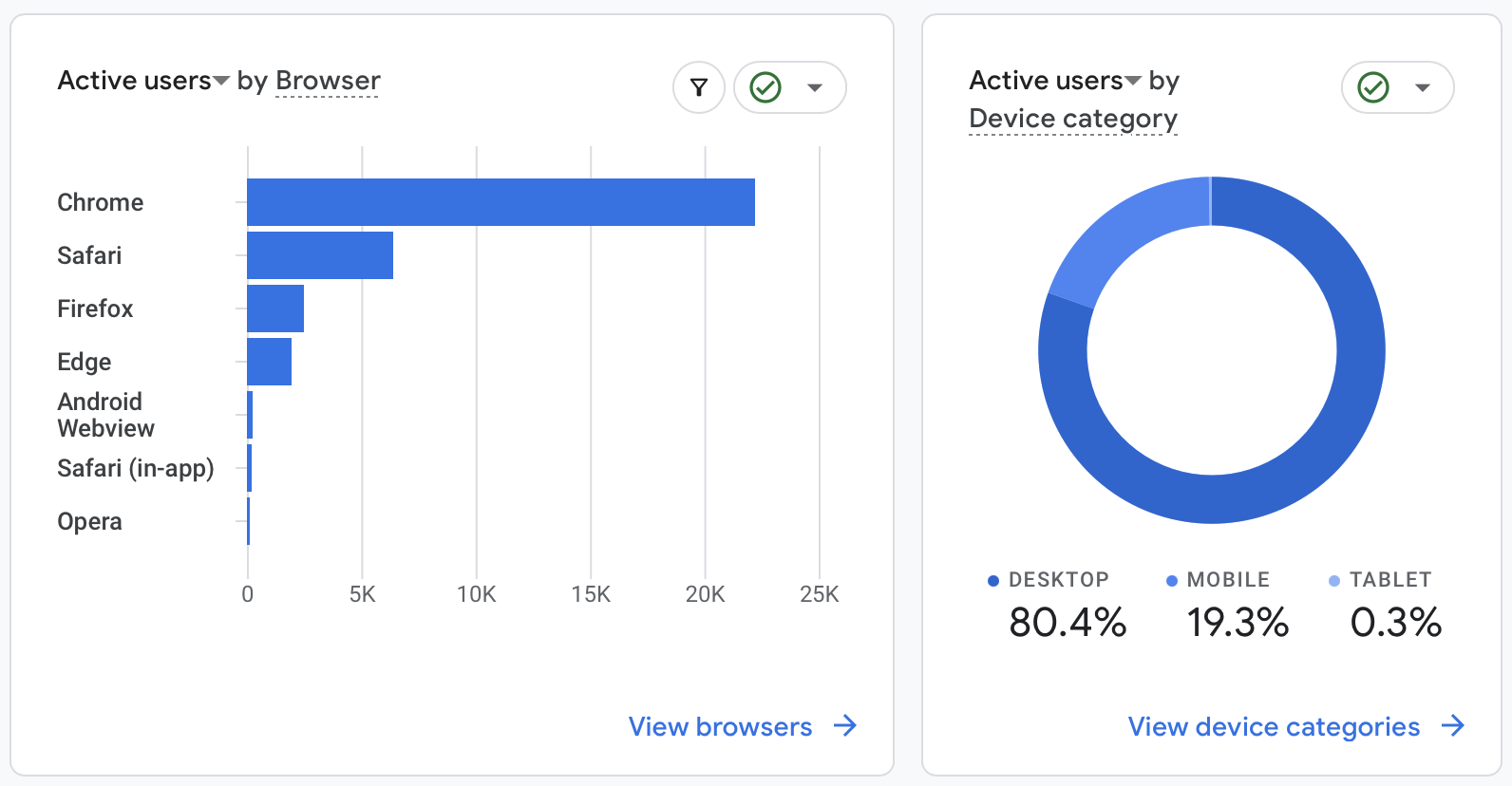
What surprises me is the poor representation of privacy-focused tools like Firefox, Opera, and Brave. Perhaps online privacy consciousness would be an interesting topic for a future community call?
Bounce Rate & Engagement
We found that overall the average engagement time per active user per month is 1m 06s. Per session of using our site, the average engagement time is only 38 seconds. This is quite low, and may suggest that visitors are mostly landing at the site in order to redirect elsewhere (such as during a job search). So, it begs the question: how can we improve the experience on the website to encourage users to visit and stay longer, and ultimately explore more? What do you expect to interact with when you visit the US-RSE website? How can we make visiting the site more valuable for you? Let us know by pinging the Slack #website channel…
Trends
That being said, this writer is proud to report that our website has had an overall increase in traffic since we reinvigorated the newsletter in March.
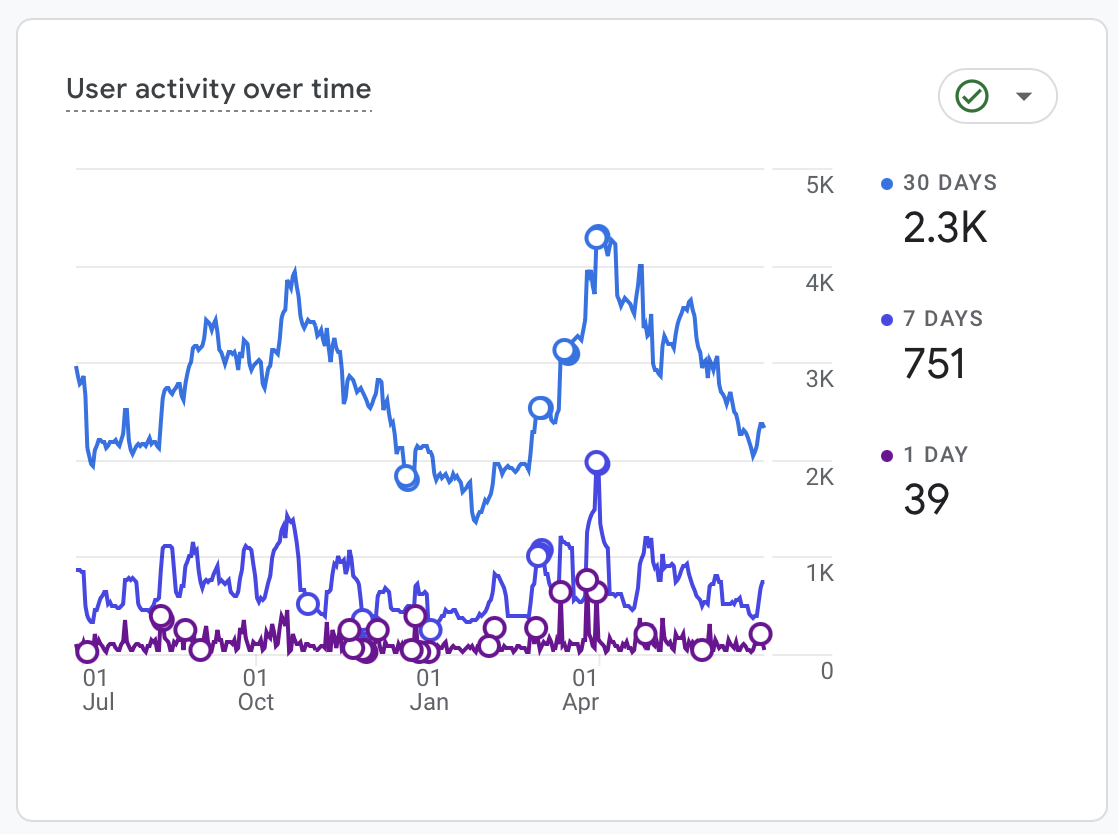
New vs. Returning Visitors
The comparison between new and returning visitors is a great way to measure the growth of our community. We can see that the number of returning users spikes quickly after the conference, and dwindles slowly as people move on to other things. New user attraction should be a priority, however, so we should think about ways to keep that post conference momentum going.

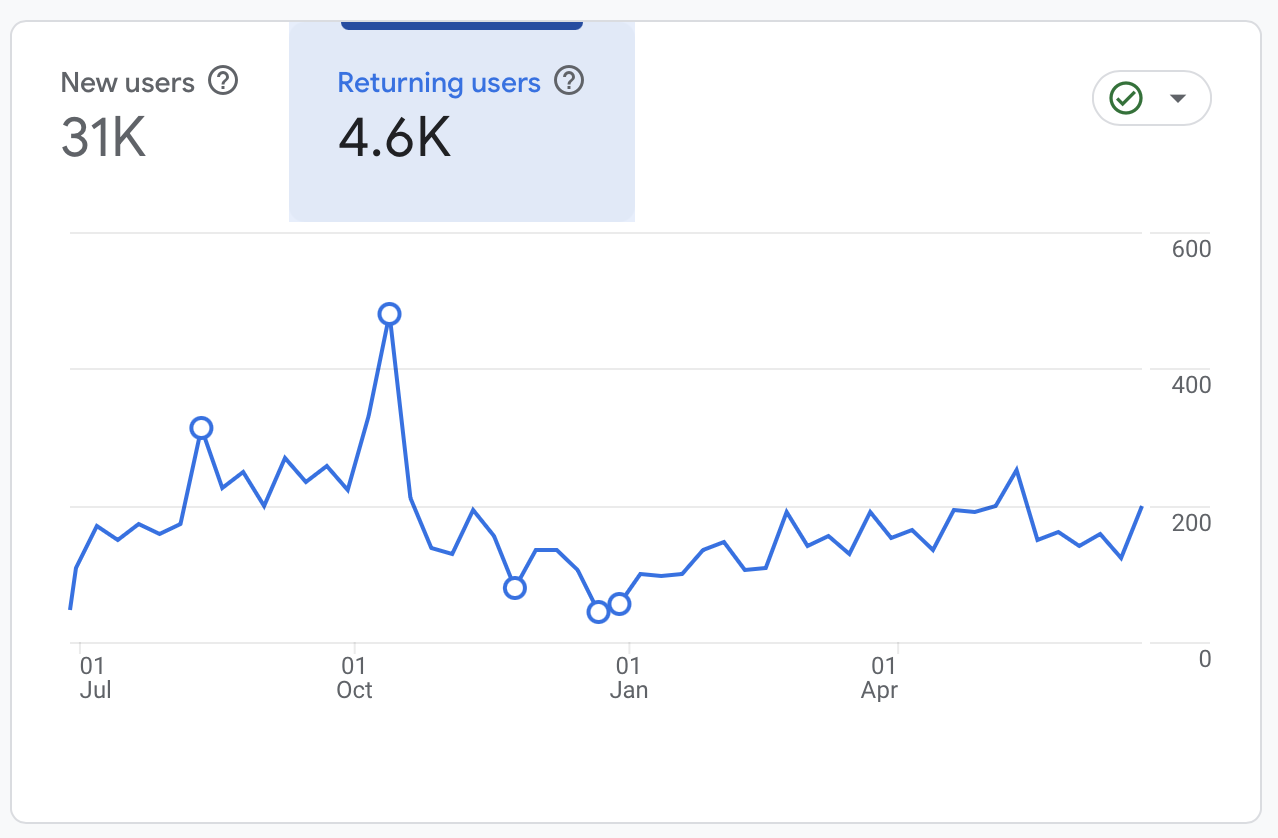
Conclusion
Web analytics can offer a valuable snapshot of how a community and visiting audiences engage with a digital organization. For us, the data highlights the importance of our job board, and the (potentially) global reach of our resources, but also points out opportunities to improve engagement and retention. And this is just a basic breakdown of stock charts provided by the Google Analytics4 service… what more could we uncover as we dig into deeper data points?
As US-RSE continues to grow, your feedback will be essential in shaping the tools, resources, and interfaces we implement for the community. So, we ask you — what would make the US-RSE website more useful? Share your thoughts in the #website Slack channel by joining the org and signing up to the slack group Slack here. Together, we can make us-rse.org an even more vibrant hub for research software engineers!
🛞 3. Steering Committee Updates
Over the past month, the Steering Committee approved the 2025 US-RSE Community Awards program proposed by the Community Awards Working Group. We continued discussions on the US-RSE response to the changing federal funding landscape, and reaffirmed that providing an inclusive environment with equitable treatment for all remains a core part of our mission. We received an update on fundraising efforts from the Executive Director and reviewed our budget for the upcoming fiscal year. Finally, we further defined tasks and priorities for a new Community Manager, identified chairs for the USRSE’26 conference, and addressed some administrative issues regarding our processes for posting to social media and sending email announcements.
🤝 4. Organizational Founding Membership
US-RSE envisions a future where Research Software Engineers are universally respected for advancing science, technology, and society through the transformative power of research software engineering. We’re excited to share that the momentum around our Organizational Founding Membership continues to grow! See the list below for the current members (six more are onboarding at the moment).
Organizations that join on or before November 30, 2025, will be recognized in perpetuity as founding members. Founding organizations will also lock in current membership fees through December 31, 2028. Organizational support helps sustain and expand vital community offerings, including the annual conference, monthly calls and newsletter, job board, working groups, and new resources.
Please reach out to Sandra Gesing at sandra@us-rse.org if you are interested in becoming an organizational founding member!
Premier Members
Standard Members
Basic Members
✈️ 4. Community and Travel Funds program
Part of the Alfred P. Sloan Foundation grant for US-RSE has been delegated for the Community and Travel Funds program. Members of US-RSE can apply for funds for community or individual purposes for event costs, get-togethers, travel funding, and more.
The next application deadline is March 31, 2026. We encourage you to apply for funding to support your community and travel needs!
The application process is simple and straightforward. You can find the application form here.
🗞️ 6. Community News
Community Calls
During our last community call, we got some great suggestions for future topics, including lots of interest in learning about the US-RSE community, careers, and funding. Our July community call on Thursday, July 10, 12pm ET/11am CT/10am MT/9am PT will cover all of these topics (and maybe more!).
If you’d like to give a brief 3-5 minute talk on your story, we’d be happy to hear from you. This could be talking about what your current role is and what you’re working on, how you’re funded, or the path you took to get where you are today. Even if you’re not an RSE, you’re here, so you’re part of our community, and we’d love to hear what you do and how your work relates to RSE.
Please reach out to Julia Damerow or Abbey Roelofs via Slack if you’re interested in presenting, and visit the Community Calls Website for more information and to access the registration link.
June Community Call
In our last community call, we discussed the use of AI tools in research software engineering. From the Mentimeter poll, we learned that the majority of you are using AI tools once or twice a day for — obviously — coding support, and that you believe that if AI became sentient, the first thing it would do is… worship cats…? Y’know, sounds about right 🐈
👀 7. Interesting Events and Opportunities
🦄 They Arrived as a Herd… But They’re Ready to Travel to You! 🚀
The 2025 US-RSE magical unicorns have officially arrived!
👉 https://give.communityin.org/unicorn2025?ref=ab_20w0PysS59P20w0PysS59P
🚀 Call for abstracts: Research Software Engineers in HPC (RSE-HPC-2025)
To be held as part of SC25, St. Louis, MO, USA and online, Sunday, November 16, 2025, 8:30 am - 5:00 pm CST (UTC-6)
=== Overview ===
Research software engineers (RSEs) are critical to the impact of HPC, data science, and the larger scientific community. They have existed for decades, though often not under that name. The past several years, however, have seen the development of the RSE concept, common job titles, and career paths; the creation of professional networks to connect RSEs; and the emergence of RSE groups at universities, national laboratories, and industry. This workshop will bring together RSEs and allies involved in HPC, from all over the world, to grow the RSE community by establishing and strengthening professional networks of current RSEs and RSE leaders. We’ll hear about successes and challenges that RSEs and RSE groups have experienced, and discuss ways to increase awareness of RSE opportunities and improve support for RSEs.
The workshop will be highly interactive, featuring breakout discussions and panels, as well as invited addresses and submitted talks.
=== Submissions ===
We encourage prospective participants to submit abstracts of proposed lightning talks (limit of 1 page, no format prescribed) on topics related to RSE issues. Possible topics include, but are not limited to:
- Career paths: how should RSEs be hired, promoted and evaluated?Building RSE organizations: how to find RSEs in your country/region and how to motivate them to join the network and engage?
- Supporting RSE organizations: what can be done to help RSEs (and those supporting RSEs) at international, national, regional, and local levels?
- Making the business case for RSEs and RSE groups: evidence, case studies, tactics
- How do we want funders to support RSE roles and activities?
- Building in RSE requirements as part of wider research infrastructure
- Providing mentoring and training for RSEs
- How will RSEs contribute to new technologies such as AI/ML, quantum computing, neuromorphic computing?
The authors of accepted abstracts will be invited to present lightning talks or participate in panel discussions at the workshop. Note that SC25 is planning an in-person event and presenting in-person is encouraged. A supporting digital experience will accommodate those who cannot attend in-person due to travel restrictions or health concerns.
We particularly encourage submissions from first-time conference presenters, and from members of groups that have historically been underrepresented in the HPC community. The deadline for submissions is Friday, August 8, 2025, at 11:59 PM AoE (UTC-12).
🚀 Generative AI in the Workplace Survey📊
The Academic Data Science Alliance, US Research Software Engineer Association, and Schmidt Sciences are working together to uncover how Research Software Engineers (RSEs) and those in adjacent workspaces (e.g., research team members, data scientists) are using Generative AI in the workplace.
The goals of this survey are to capture broad “state of the field” information and to help define topic areas for a set of convenings with the RSE community over the coming year. These convenings are intended to dig into the details of AI use in the RSE workplace: to understand what’s already happening, identify key challenges and opportunities, and explore how RSEs themselves can actively shape the future of AI-augmented research software engineering.
Please take a moment to fill out the survey here
🚀 Supercomputing and the Future of AI: Watch the Full Virtual Exchange Series On-Demand! 🤖
Our exciting webinar series for K–12 classrooms, presented in partnership with Reach the World, has officially wrapped! Over the past ten weeks, more than 840 students joined us to explore the fascinating world of supercomputing, quantum computing, and artificial intelligence. Now, all episodes are available to watch on-demand along with companion journal articles that bring the topics to life for students, educators, and curious minds of all ages. Together with Reach the World, US-RSE created this virtual exchange to offer a behind-the-scenes look at how research software engineers and data scientists use cutting-edge computing to tackle real-world challenges.
Learn more at ReachTheWorld.org, and please reach out to Sandra Gesing with any questions
🚀 Code Review Study
Dr. Jeffrey Carver, Dr. Nasir Eisty, and Md Ariful Malik from the University of Alabama are conducting a study to explore the code review process used by Research Software Engineers (RSEs).
As an RSE, we invite you to participate in an interview to share your experiences with the code review process. The interview will take approximately 15–20 minutes and can be conducted via Zoom or in person, depending on your preference.
Your participation is completely voluntary and confidential. Information will be kept anonymous, and with your approval, we will record the audio of the interview. Any personal information will be deleted after the interview. You may choose to withdraw at any time before or during the interview. To be eligible, you must be 18 years or older. This study has been approved by the University of Alabama Institutional Review Board.
We would greatly appreciate your participation and insights. Thank you in advance! If you are interested in being interviewed, please fill out this short information form so we can contact you to schedule an interview.
🚀 O٭NET Data Collection Program📊
The O٭NET Data Collection Program, sponsored by the U.S. Department of Labor, is seeking your input as a potential expert for Computer and Information Research Scientists and Computer Programmers. We believe that this is an important project and encourage our members to participate. As the nation’s most comprehensive source of occupational data, O٭NET is a free resource and provides instant access to detailed descriptions on more than 900 occupations that drive the U.S. economy. Visitors include counselors, human resource professionals, researchers, developers, and students, to name a few. Visit O٭NET Data Collection to learn more.
💎 Occupation: Computer and Information Research Scientists
✏️Description: Conduct research into fundamental computer and information science as theorists, designers, or inventors. Develop solutions to problems in the field of computer hardware and software.
💎 Occupation: Computer Programmers
✏️Description: Create, modify, and test the code and scripts that allow computer applications to run. Work from specifications drawn up by software and web developers or other individuals. May develop and write computer programs to store, locate, and retrieve specific documents, data, and information.
A random sample of experts responding to this request will be invited to complete a set of questionnaires. Experts who are selected and agree to participate will receive a $40 VISA gift code and a certificate of appreciation from the U.S. Department of Labor. If you are interested in learning more and potentially volunteering, please visit the Computer and Information Research Scientists O٭NET Volunteer Information Page or the Computer Programmers O٭NET Volunteer Information Page.
📆 Please respond by 7/11/2025.
Learn more at the official O٭Net Data Collection Program website.
🚀 Open Innovation Sprint
Research software is the engine driving modern science and discovery. From analyzing complex datasets to simulating intricate phenomena, it’s an indispensable part of the research lifecycle. Yet, understanding and quantifying its impact remains a significant challenge for researchers, project contributors, institutions, and funders alike.
How do we effectively measure the reach and influence of these vital tools? How can we incentivize better practices around software citation, metadata, and sustainability?
To tackle these shared ecosystem challenges head-on, NumFOCUS’s Open Source Science Initiative launched the 2025 “Impact of Research Software” Open Innovation Sprint!
Running from March through late 2025, this sprint is a collaborative, fast-paced initiative bringing together researchers, engineers, designers, community organizers, and users. Our goal is to produce actionable, community-driven outputs – open source tools ready for immediate use and contribution.
This inaugural sprint, focused on measuring research software impact, is inspired by efforts such as the CZI 2023 Software Impact Hackathon, is led by NumFOCUS’s Open Source Science Initiative, and is made possible through collaboration with the Research Software Alliance (ReSA), Open Source Collective and ecosyste.ms, and the Sprint’s contributors and their organizations.
📢 Social Coworking and Office Hours: Research Software Engineering and R
📅 When: Tuesday, July 1, 2025, 16:00–18:00 UTC
📍 Where: Online, 🌐
Join us for 2 hours of coworking and conversation on the first Tuesday of the month! This session focuses on Research Software Engineering and R, hosted by Saranjeet Kaur Bhogal, Research Software Engineer at Imperial College London and advocate for Open Science and Communities of Practice.
Come for the full session or drop in as needed!
Cowork:
- Catch up on your R work
- Plan or polish that package you’ve been meaning to build
- Work independently or alongside others
Socialize & Network:
- Meet other R users and rOpenSci staff
- Ask questions, share best practices, and get support
- Discuss what it means to be an R-focused Research Software Engineer
Join us on Zoom to cowork, connect, and share! Register or join the event
📢 Using Generative AI for Coding Tasks in Scientific Software
📅 When: July 09 1:00 pm - 2:00 pm EDT
📍 Where: Online, 🌐
The advent of large language models (LLMs) has generated a great deal of interest in their use for coding tasks. However, a well-known limitation of LLMs is that there are no guarantee of either truthfulness or correctness for the generated results. Therefore, we are not yet in a position where human intervention can be eliminated from these coding tasks, particularly in scientific computing where training data has been sparse and software is exploratory. We have been exploring the use for generative AI for a diverse set of tasks in scientific software development, including translation from Fortran to C++, writing code for a new algorithm, and refactoring existing code. A robust verification methodology has emerged as the most important component of accomplishing any coding task reliably with LLM assistance. In this webinar we will share our insights from our explorations.
Presented by Anshu Dubey (Argonne National Laboratory), and Akash Dhruv (Argonne National Laboratory)
📢 Practice and Experience in Advanced Research Computing (PEARC) 25: The Premier Research Computing and Data Conference
📅 When: July 20–24, 2025
📍 Where: Columbus, OH
Is PEARC25 right for you and your team? Whether research computing and data (RCD) is your primary focus or one aspect of your role, PEARC25 has something valuable to offer. This conference brings together professionals and students from emerging programs to well-established research centers.
Why attend?
- 🤝 Connect & Collaborate with RCD peers from universities and research institutions
- 💡 Develop Your Expertise through hands-on tutorials and real-world case studies
- 🚀 Explore Key Topics like AI in research, cloud integration, scientific workflows, software engineering, and data management
PEARC25 offers a high-quality, practical, and cost-effective experience — with all workshops and tutorials included in your registration. Whether you’re looking to deepen your technical skills or shape the future of RCD, this is the place to be.
Conference Highlights:
- Keynote Speakers: Distinguished experts in advanced computing and data science will share groundbreaking insights and future directions
- Technical Program: Over 100 presentations, workshops, and tutorials covering the latest advancements in research computing with all workshops and tutorials included in the registration fee
- Networking Opportunities: Connect with hundreds of professionals from academia, government, and industry
- Professional Development: Hands-on workshops and training sessions to enhance your technical skills
- Student Program: Special sessions and mentoring opportunities for students and early career professionals
Ready to join the RCD community at PEARC25? Register now or learn more here!
📢 Gateways 2025 Annual Conference
📅 When: Tuesday, October 28 – Thursday, October 30, 2025
📍 Where: The Oneida Hotel, Green Bay, Wisconsin
Gateways 2025 bridges the connection between science and gateways, bringing together developers, researchers, and users to learn, share, and collaborate. Hosted annually in the U.S., the conference features a robust program of keynotes, short papers, panels, posters, tutorials, demos, and open access proceedings.
This year’s event will also offer a special journal publication opportunity for all accepted papers.
Whether you’re a seasoned gateway developer or just getting started, Gateways is a great way to expand your skills and network in a welcoming, interdisciplinary environment.
Presentation and Publication Options We invite the submission of papers and abstracts related to science gateways. All contributions will be subject to standard peer review on quality and relevance. This will apply to tutorial sessions, papers, panels, posters, demos, and BYOP (Bring Your Own Portal). Tutorial sessions, papers, panels, posters, and demos will be published openly accessible in Zenodo. Please note that authors of papers will be invited to submit an extended and updated version of their paper for a special issue journal on science gateways.
- Tutorial submissions are due
June 16, 2025July 9, 2025 (Extended!) - Paper, demo, and panel submissions are due
June 16, 2025July 9, 2025 (Extended!) - Poster and BYOP - Bring Your Own Portal submissions are due August 4, 2025
- Student Poster submissions are due September 10, 2025
Learn more and get involved. Want to help shape the event? Email help@sciencegateways.org to join the planning committee.
📢 WorkflowHub: A registry for computational workflows
📅 When: July 16, 2025, 11am-11.30 PST / 2pm-2.30 EST / 20:00-20:30 CEST
📍 Where: Online, 🌐
This talk, based on this Nature paper will explore how WorkflowHub promotes discoverability and reuse of computational workflows by unifying diverse workflow ecosystems and supporting FAIR, shareable workflows across global research communities.
Register at the link below (if you are already registered for the series, you can attend using the link in the calendar invite)
🤵♀️Hosts: Stephen Hudson, Daniela Cassol🤵
📢 Reproducible Machine Learning Workflows for Scientists Workshop 2025
📅 When: Aug 12–14, 2025, 8:30 AM – 4:00 PM US Central Time
📍 Where: Discovery Building, 330 N. Orchard St, Madison, WI 53715 🏛️
This national workshop introduces Pixi, a modern open-source tool for creating reproducible computing environments across heterogeneous platforms. Participants will gain hands-on experience building and deploying Python-based machine learning workflows with hardware acceleration and containerization, focusing on real-world reproducibility challenges.
No prior experience with machine learning or Pixi is required, but familiarity with the command line, Git, and Python is expected. Early-career researchers are especially encouraged to apply.
🏨 Lodging stipend available for up to 10 non-local participants.
🤝 Instructors: Matthew Feickert, Chris Endemann, Ryan Bemowski, Raheem Hashmani
🎓 Supported by: URSSI, Sloan Foundation, OSG Consortium, UW–Madison Data Science Institute
📚 8. Featured Reads, Videos, and Podcasts
📑 Recent Publications
- N. Kosmyna, E. Hauptmann, Y. T. Yuan, J. Situ, X.-H. Liao, A. V. Beresnitzky, I. Braunstein, P. Maes, “Your Brain on ChatGPT: Accumulation of Cognitive Debt when Using an AI Assistant for Essay Writing Task,” arXiv preprint, arXiv:2506.08872, 2025. Read the article.
Editor’s Note: This study investigates the neural and behavioral effects of using large language models (LLMs) like ChatGPT for essay writing, and stirred up quite some discussion on slack. Using EEG and NLP analysis, the authors found that reliance on LLMs is associated with reduced brain connectivity, diminished memory recall, and lower self-reported ownership of written work, which suggests that long-term use may incur cognitive costs and hinder learning. Even as I write this newsletter, I find myself using an LLM to help me write
liquidcode snippets, quickly format HTML, and edit wording. This article is extremely timely and well worth a read as we continue to understand the potential effects of LLMs on our wellbeing.
-
O. J. R. Gustafsson, S. R. Wilkinson, F. Bacall, S. Soiland-Reyes, S. Leo, L. Pireddu, S. Owen, N. Juty, J. M. Fernández, T. Brown, H. Ménager, B. Grüning, S. Capella-Gutierrez, F. Coppens, C. Goble, “WorkflowHub: a registry for computational workflows,” Scientific Data, Vol. 12, Article 837, 2025. Read the article.
-
B. Bruntink, “A Multimodal Machine Learning Approach for Automated Research Software Classification,” Master’s thesis, Utrecht University, 2025. Read the thesis.
-
Y. Xia, S.-R. Tsai, M. Turk, “DeepGit: Promoting Exploration and Discovery of Research Software with Human-Curated Graphs,” 2025. Read the paper.
📝 Blog Posts
-
L. Parsons, “US-RSE Celebrates LGBTQ+ Pride,” US-RSE.org, Jun 13, 2025. Read the post.
-
L. Parsons, “US-RSE Pride Month Spotlight - Edith Windsor,” US-RSE.org, Jun 16, 2025. Read the post.
-
C. Brown, “We Hosted a Workshop for Practitioners—No One Came,” Code World, No Blanket, Jun 5, 2025. Read the post.
-
T. Ptacek, “My AI Skeptic Friends Are All Nuts,” fly.io, Jun 2, 2025. Read the post.
🎧 Podcast Highlights
Recent episodes from the #code4thought podcast:
-
Parsl: a Python library for parallel programming - with Dan Katz and Ben Clifford Listen here
-
Open Research - at FOSDEM 2025 Listen here
🏃 9. Get Involved
US-RSE Working Groups:
- Code Review
- Community Calls
- Diversity, Equity, and Inclusion
- Education and Training
- Group Management
- Mentorship Program
- Outreach
- RSE Empowerment in National Labs
- Testing
- User Experience
- Website
🧑💼 10. Recent Job Postings
-
Scientific Applications Programmer
📍 Lynker, College Park, MD (remote possible)
🗓️ Posted: 2026-02-11 | Expires: 2026-04-30 -
Open Source Software Technology Program Developer
📍 Kitware, Inc, Clifton Park, NY
🗓️ Posted: 2026-02-09 | Expires: 2026-05-15 -
Senior Software Engineer
📍 Internet2, Remote
🗓️ Posted: 2026-01-28 | Expires: 2026-04-30 -
Research Software Engineer
📍 [C]Worthy, Boulder, CO
🗓️ Posted: 2026-01-18 | Expires: 2026-02-15 -
Data Science Engineer
📍 Lawrence Berkeley National Lab, Berkeley, CA
🗓️ Posted: 2026-01-07 | Expires: 2026-03-01 -
Lead Research Software Engineer
📍 Princeton University, Princeton, NJ
🗓️ Posted: 2026-01-06 | Expires: 2026-03-31 -
Lead Research Software Engineer
📍 Yale Center for Geospatial Solutions, Yale University, New Haven, CT (can be remote)
🗓️ Posted: 2025-12-10 | Expires: 2026-03-01 -
Research Engineer / Research Scientist
📍 Aeolus Labs, San Francisco, CA
🗓️ Posted: 2025-12-08 | Expires: 2026-04-30 -
Senior Manager, Research Software Engineering
📍 Rosen Center for Advanced Computing, Purdue University, West Lafayette, IN
🗓️ Posted: 2025-11-13 | Expires: 2026-02-27
Other Job Boards
- Research Software Engineering Opportunities in other associations/societies
- Software Carpentries Job Opportunities
- Academic Data Science Alliance Jobs
- High Performance Computing (HPC) Jobs from hpc.social
- SGX3 and SGCI Science Gateways Community Jobs Board
This newsletter is a joint effort of members of the US-RSE Association.
© US-RSE • 2021–2026 • US-RSE is a fiscally sponsored project of Community Initiatives
